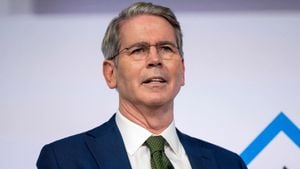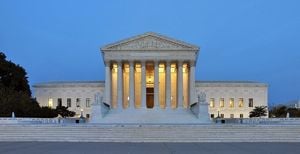OMAHA, Neb. - The 2024 elections have recently yielded significant results, particularly spotlighting Republican U.S. Representative Don Bacon, who managed to retain his seat representing Nebraska's 2nd Congressional District. This district is known for its political tension, often viewed as pivotal for both major parties' dreams of securing a congressional majority.
Bacon's victory over Democratic State Senator Tony Vargas marks the second time he has successfully defended his seat since his first election back in 2016. Despite facing what many deemed one of his toughest challenges yet, Bacon triumphed, demonstrating his resilience and adaptability within the politically shifting terrain of Nebraska.
While most districts across the nation align with either party during presidential elections, Nebraska operates under unique rules. The state, along with Maine, distributes its electoral votes based on congressional districts, meaning Bacon's performance also reflects the dynamics of the presidential race. The 2nd District, which voted for President Biden earlier, has shown it can sway back to the right, evidenced by Bacon's narrow win.
Upon examining the election data, it's clear Bacon achieved this remarkable feat through adept campaigning. According to political analyst Adam Carlson, Bacon excelled by outperforming both the presidential candidate from his party and his opponent, achieving what’s known as ‘overperformance.’ His metrics indicated he scored 6.46 percentage points above what might have been expected based on Trump’s performance from 2020.
Using the insights from polling and internal data, Bacon strategized to capture those crossover voters. “We knew we needed some crossover voters,” Bacon mentioned, indicating he worked extensively on reaching out to those who don’t typically align with the GOP. His campaign team knocked on tens of thousands of doors to make personal connections with constituents.
This approach paid off as his campaign, along with external groups, poured approximately $18 million behind his candidacy, compared to Vargas's $14.2 million. The 2nd District, viewed as somewhat of a Democratic lean this election year, reflected the changing sentiments, with Bacon pulling out the win with CDC-style campaigning and disciplined messaging focused on his bipartisan results.
Bacon is not just any Republican; he’s noted for his military background, having commanded the 55th Wing at Offutt Air Force Base. This history has helped shape his image and garner respect from constituents, identified by some political consultants as the ‘secret sauce’ to his electoral success. His reputation as “a common-sense conservative” who listens to his constituents has also played a significant role.
Resistance was certainly present, with Vargas performing strongly too. He campaigned on issues such as reproductive rights and healthcare, connecting with voters on those fronts. Vargas's efforts were commendable, earning him substantial voter support, particularly within the Lincoln community, but not enough to secure victory.
Throughout the election, contrasting strategies became evident. Vargas pushed heavily for progressive causes, yet Bacon personalized his dialogues with constituents, helping paint the picture of moderate representation. Should Trump have had more involvement and supportive ad spending, the election dynamic might have shifted again. But Trump’s camp largely neglected the district, leaving room for Bacon’s rise.
Election outcomes like Bacon's hold broader implications beyond just local politics. They showcase how dynamic and multifaceted voter attitudes can be. Complementing this, the Nebraska elections also witnessed significant developments within smaller political races.
One of the more intriguing narratives this election season was out of Denton, where the village's elections ended up being quite contentious due to the outcome being locked in historic mathematics. A tie occurred between two candidates, husband and wife John Juricek and Amanda Fangmeier, marking it as the first time such a close contest happened.
After some initially via recounting, the Lancaster County Election Commissioner indicated the results aligned exactly as they previously were. Given the inability to break the tie by other means, Juricek opted out, allowing Fangmeier to secure her spot on the Board of Trustees.
This unusually tight race has prompted discussions across the community on electoral processes and future modifications. The “dramatic twist” of having two related candidates contesting under such circumstances brought both humor and seriousness to the voting outcome, reinforcing how some of the most mundane electoral mechanics can turn prevalent.
These diverse outcomes and experiences reflect today’s Nebraska far beyond historical voting blocks. New political dynamics are coming to surface, as evidenced by the numerous races across the state. The general consensus is indicating movement toward more competitive, community-focused politics, stemming from both local issues and the broader national mood.
Both Bacon's win and the tie situation highlight the complexity and excitement of Nebraska’s political environment. A Republican incumbent retains his seat, and on the other end, local governance takes on almost soap-opera-style narratives. With the 2024 elections over, Nebraskans will certainly have plenty of stories to tell as they sit back and watch how these results play out.



